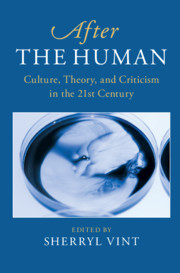Book contents
- After the Human
- After Series
- After the Human
- Copyright page
- Contents
- Contributors
- Acknowledgments
- Introduction
- Part I After Humanism
- Part II New Objects of Enquiry
- Part III Posthumanities
- Chapter 11 More-than-Human Biopolitics
- Chapter 12 New Materialisms
- Chapter 13 Speculative Realism
- Chapter 14 Race and the Limitations of “the Human”
- Chapter 15 Speculative Fiction
- Chapter 16 Aesthetic Manipulation of Life
- Collective Works Cited
- Index
Chapter 16 - Aesthetic Manipulation of Life
from Part III - Posthumanities
Published online by Cambridge University Press: 26 November 2020
- After the Human
- After Series
- After the Human
- Copyright page
- Contents
- Contributors
- Acknowledgments
- Introduction
- Part I After Humanism
- Part II New Objects of Enquiry
- Part III Posthumanities
- Chapter 11 More-than-Human Biopolitics
- Chapter 12 New Materialisms
- Chapter 13 Speculative Realism
- Chapter 14 Race and the Limitations of “the Human”
- Chapter 15 Speculative Fiction
- Chapter 16 Aesthetic Manipulation of Life
- Collective Works Cited
- Index
Summary
In recent times human-made dry, electrical, mechanical, digital, and algorithmic technologies are becoming more lifelike, while at the same time biological, moist, messy life are treated more as controllable technologies. What are the reasons that compel humans to attempt to assert control over living systems that exist independently from us, while at the same time relinquishing control over non-living technologies? Living in times of technological acceleration and unfolding ecological catastrophe, we face a poverty of available metaphors and, more importantly, a poverty of our language in relation to Life. This lack is being occupied by artistic expressions, where artists engage with the materiality of biological bodies to articulate new meanings and poetics. Here, we will explore these phenomena through the genre of BioArt (AKA Biological Art), which gained momentum from the mid-nineties and had effects beyond the art world, impacting industry and the public imagination.
Keywords
- Type
- Chapter
- Information
- After the HumanCulture, Theory and Criticism in the 21st Century, pp. 236 - 251Publisher: Cambridge University PressPrint publication year: 2020

